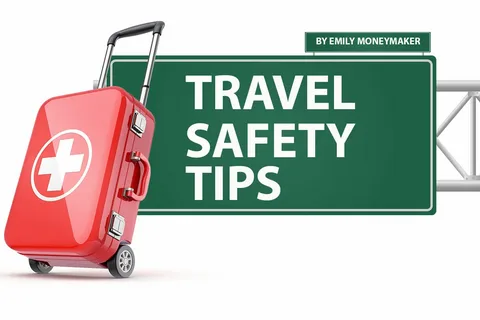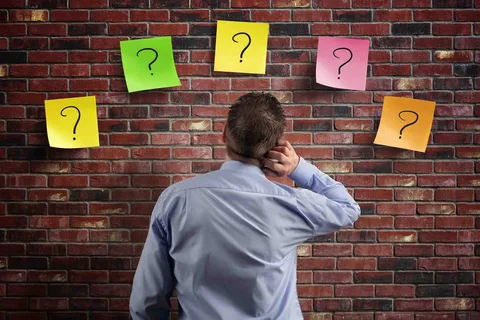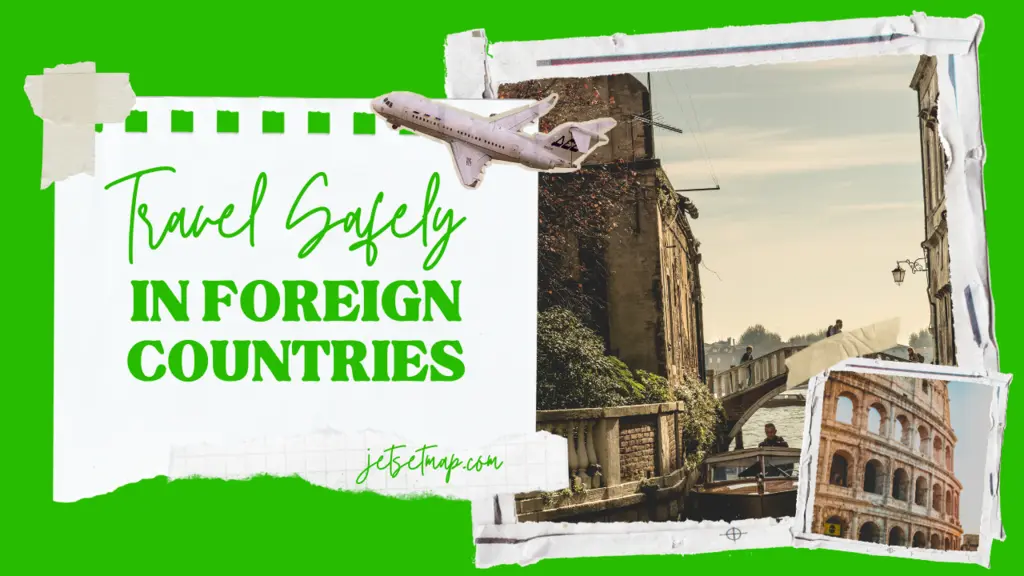How to Travel Safely in Foreign Countries. That is that we were not able to go abroad for any dream but dreams come true to of applicable where. The exotic ruins, colors of foreign foods and cultures that yet have to be discovered. After all, while travel can be an adventure and exciting time to experience new things, it is also about staying safe. But in all seriousness, nobody wants to play live-action versions of “Find My Passport” and ideally speaking from personal experience, also not “Don’t Get Pickpocketed”. Search This is how to travel abroad safely–tips with a laugh, it sort of makes sense: Travel Safety Tips
How to Travel Safely in Foreign Countries.
Planning Your Trip: The Essential Foundation
But a safe trip is the foundations of your journey and it starts much earlier than that, even before what you should be getting ready to packing. Here’s how to get started:

Research Your Destination
Apply this to a journey where you do not know the local customs, laws, or dangers. Diving into water when you dive and then there IS no water and the ground JUST KEEPS COMING CLOSER OMGLAWS_HANDLER. ~-water~ Yes & read here for header Section Research Points
- Local Laws and Customs: Different countries have different rules. For example, in some places, tipping is considered rude, while in others, it’s expected. In certain countries, wearing revealing clothing might be frowned upon. Understanding these nuances can help you avoid awkward or even illegal situations. For instance, did you know that in Japan, it’s considered rude to tip in restaurants? It’s better to avoid making a cultural faux pas. Safe Travel in Foreign Countries
- Warnings and Alerts (health and safety warnings, advisories) The WHO and the CDC are good places to check for emerging risks of disease or many other outbreaks like Natural disasters. Other countries may even have requirements for certain vaccines. Dont forget to see your prospectively doctor and ask him/her for recommendations if you are going to a malaria risk zone. How to Travel Safely in Foreign Countries.
Secure Your Documents
Traveling without documents is like taking your life on the road. But then they will ruin even the most perfectly relaxed dream vacation: How to Travel Safely in Foreign Countries.
- Passport: Check your passport is not expired, and make sure it will still have at least six months of validity left after your return. And a lot of countries won’t get you in if your passport is nearing its expiration! You should have 1 blank page left on your passport for visas or entry and make sure it will be valid at least for 6 months.
- Visas: Visas are essential to enter some destinations. Determine whether you’ll need one, and apply early! The process may differ slightly depending on the country, thus you should begin early to prevent any last-minute tension. If visiting India you would maybe have to apply for an e-Visa or get a visa from the Embassy.
- Copies — Photocopy your passport, visa and everything else important. Keep these copies at a location away from the original one and sit relax. It is as if there was a Plan B… for when those originals decide to take one of their unscheduled vacations.
Health Preparations
Some read affords are essential when it comes to keeping your health on point while traveling. You do not want to be sick on vacation: How to Travel Safely in Foreign Countries.
- Vaccinations : Some destinations require specific vaccinations to travel there. For example, you might need a yellow fever shot for regions of Africa. Go to your doctor or travel clinic well before your trip to get all the shots.
- Medications: This will include all of your prescription medications, so do not forget to take the necessary steps to keep them in their original packaging. An additional option is to bring along some pain relievers, medications for stomachaches and a sore throat or allergies.
Packing Smart: What to Bring and Why
Packing for safety is equally as important as packing for comfort. This is how you can make sure of it : How to Travel Safely in Foreign Countries. Travel Safety Guidelines

First Aid Kit
A fully equipped first aid kit will support you. Should include:
- Essential Supplies: Carry bandages, antiseptic wipes, and gauze pad They will be useful when you get little cuts and scrapes. You essentially have a tiny trauma room in your messenger bag
- The pain relievers: The common pain relievers like ibuprofen or paracetamol. From a headache from that lengthy flight to some sore muscles from all your gallivanting, these can really make an impact.
- Prescriptions: If you are on a prescription, make sure you have enough to carry over the duration of your trip. It may also be wise to bring along a printout of your prescription, just in case you need it refilled while overseas.
Essentials
Here’s a quick checklist of essential items to pack: How to Travel Safely in Foreign Countries Safe Travel Tips.
| Item | Why It’s Important |
|---|---|
| Chargers and Adapters | To keep your electronics charged and functional. Many countries use different plug types, so a universal adapter can save you a lot of hassle. |
| Reusable Water Bottle | Staying hydrated is crucial, and having a reusable bottle helps you save money and reduce plastic waste. |
| Anti-Theft Backpack | Protects against pickpockets and keeps your belongings secure. Some backpacks come with lockable zippers and cut-resistant straps. |
Travel Clothes
- Layering: Bring clothes you can layer. You never really know with weather, so you’re likely going to want to invest in a proper layering cycle. It also means less gear to back and so can a help in this when packing.
- Respectful Clothing– Always dress according to their customs and culture. Modesty is seen as prestigious in many countries. Make sure not to wear too much revealing or indecent clothing. In most Middle East countries it will be unsuitable to expose shoulders and knees. Travel Safety Tips
Staying Safe While Traveling
Nevertheless, once you are in a place soon after: the careful mode is on. How to Travel Safely in Foreign Countries.

Be Aware of Your Surroundings
- Be Vigilant– keep your head on a swivel, especially in places with large amounts of people. Gawking tourists make perfect prey for pickpockets. It’s easy to get caught up in the excitement of a bustling market, but keep an eye on your belongings.
- Avoid Flashy Items: Don’t flaunt expensive jewelry or gadgets. It’s tempting to show off that new camera, but it can make you a target. Instead, keep valuable items hidden and secure.
Use Reputable Services
- Transportation: Stick to well-known taxi services whenever you don’t have a choice, but prefer using some ride-sharing app. Take licensed driving services, ideally those which can track that journey
- Accommodation: Choose accommodations that are well-reviewed and have good security measures. While hostels and budget hotels can be charming, ensure they have secure locks and well-lit areas.
Keep Valuables Secure
- Hotel Safe: Store your valuables in the hotel safe when not in use. Don’t leave important items lying around your hotel room, as even the best-reviewed hotels can have security lapses.
- Money Belt: Maybe carry a money belt for things like your passport and some extra cash. This easy idea is a great way to protect your precious items yet have your hands totally free.
Blend In
- Dress Like a Local: Try to dress in a way that blends in with the locals. Avoid wearing obvious tourist attire like “I Love [Destination]” T-shirts. It’s not just about avoiding attention—it’s about respecting local customs and norms.
- Learn Local Phrases: Knowing a few basic phrases in the local language can go a long way. It shows respect and can be incredibly useful in everyday situations, from ordering food to asking for directions.
Handling Emergencies: What to Do When Things Go Wrong
But emergencies can happen, regardless of how well prepared you are. Here’s how to handle them: How to Travel Safely in Foreign Countries.

Know Emergency Numbers
- Local Emergency Phone Numbers: To your own emergency phone numbers you will pay attention before you go. 112 is the one number to call in the European Union. This can be important if you need help right away.
- Hospital and Police Numbers – You also want to add the phone numbers of the local hospitals, and police stations. It is generally a useful idea to have these numbers accessible in the event of an emergency if they are not otherwise published or displayed.
Contact Your Embassy
- Lost Passport: If your passport is lost or stolen, contact your embassy immediately. This way they can assist you in getting a new key for yourself as well as let you know what to do next.
- Contacting your embassy for legal issues: when things go south, needing assistance with any legal problems towards a Facias. They may not be able to pay you a lawyer, but they will ensure it is clear what your own rights are generally and guide you throughout the system.
Lost Items
- Report Missing Items: If your luggage is lost, inform the airline/ transport service as soon as possible Take Pictures/Live Videos of Evidence: Equally important, before leaving the scene if any kind of incident like accident / damage has occurred in the train journey or cab ride. Retain your bags claim tickets and any receipts for lost items.
- Accommodation Number: Please remember the number of your accommodation in case they are sending someone to give back your missing property. How to Travel Safely in Foreign Countries.
FAQs: Addressing Common Concerns
How to be safe when traveling abroad?
Traveling abroad safely requires thorough preparation and awareness. Research your destination’s laws, customs, and health advisories. Keep your documents secure, use reputable services, and stay alert in public spaces. It’s also essential to have a plan for emergencies, such as knowing local emergency numbers and having a contact list of your embassy and accommodation.
What is the safest foreign country to travel to?
Which is the safest foreign country would often depend on the world conditions right then, as it can be a mix of different factors which help you determine your appropriate level of comfort. Japan, Switzerland and New Zealand are considered safe on account of their crime rates, security and stability. Of course, this is someone’s opinion and definitions of safety may vary from time to time — read up on the latest travel advisories as well as reviews by other travelers.
How do you feel safe in a foreign country?
Feeling safe in a foreign country involves a mix of preparation and intuition. Keep your belongings secure, stay informed about local conditions, and trust your instincts. If something feels off, don’t hesitate to remove yourself from the situation. Being cautious and prepared can greatly enhance your sense of security.
What are the three most important travel tips you consider before traveling?
The three most important travel tips are:
- Research: Understand your destination’s laws, customs, and health requirements.
- Prepare: Ensure you have all necessary documents, a well-stocked first aid kit, and emergency contacts.
- Stay Aware: Keep an eye on your belongings, use reputable services, and remain vigilant in unfamiliar areas.
Conclusion
How to Travel Safely in Foreign Countries. Traveling and experimenting the same for the first time at a different place has always been an amazing chance to get out of our comfort zones, make friends who we probably would never come across otherwise and while doing that, makes memories you will never want to forget. Use common sense, do your research, but make it safe and fun. But, on researching your destination, packing correctly and even just being careful and having travel insurance you can make all go as well as/most of the time in travelling afar. How to Travel Safely in Foreign Countries.
So, gear up, stay safe, and embark on your adventure with confidence. The world is full of wonders, and with a little preparation, you can embrace every moment without unnecessary worry. Safe travels and happy exploring!
